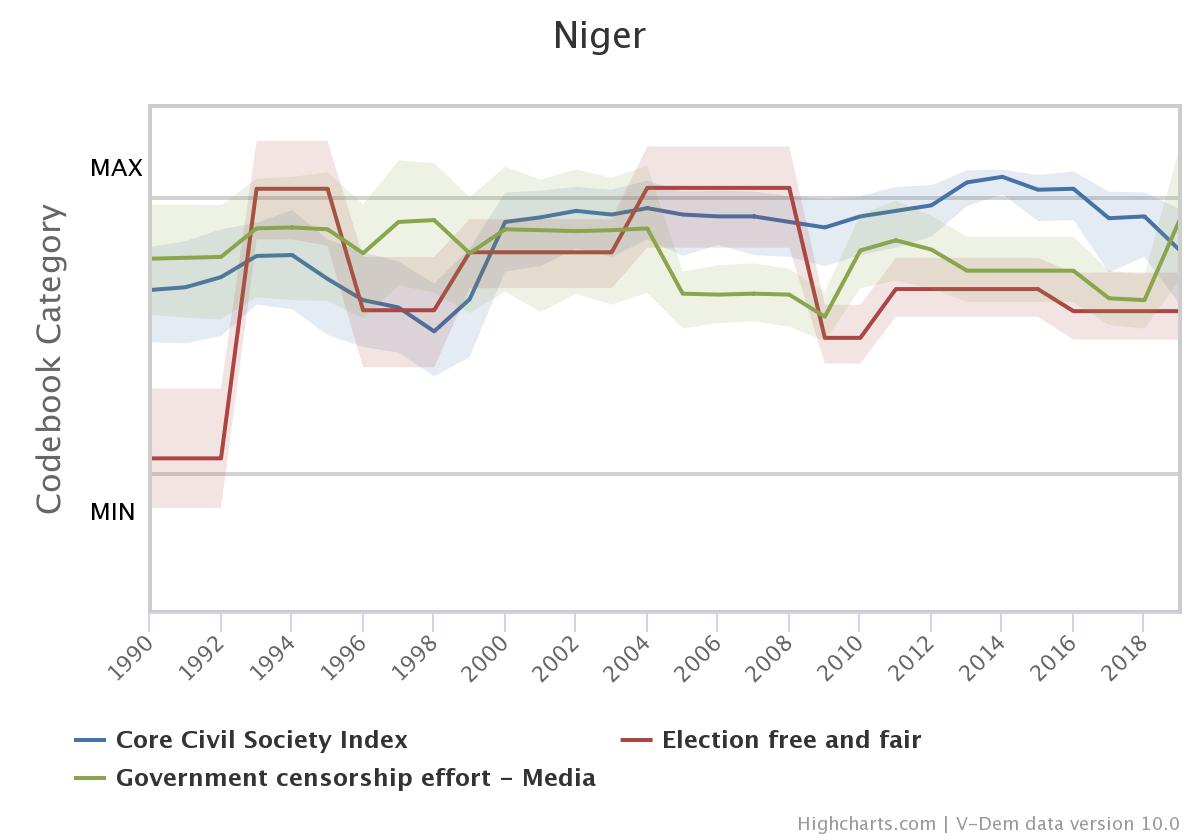General Elections in Niger
By: V-Dem Staff
Jan 12, 2021
On the 27th of December, Niger saw the first round of its presidential election which has been overshadowed by reports of violent attacks from militant groups in the country’s unstable border regions. While the second round of elections is to be held in mid-February, the country still awaits its first peaceful executive turnover. Furthermore, amidst some concerning trends of democratic backsliding, the current elections can be viewed as a yardstick for the further prospects of democracy in Niger. Therefore, in today’s weekly graph, we look at some aspects of Niger’s transition with V-Dem data.
The graph below shows the development of three V-Dem indicators for Niger between 1990 and 2019. “Elections free and fair” measures the degree of fraud and other irregularities during all stages of the election process. Higher values indicate freer and fairer elections. The Core Civil Society Index captures the extent of an autonomous civil society in which citizens are free to organize themselves. It builds upon measures of civil society organizations’ (CSO) ease of entry or exit, the level of state repression towards CSOs, and the extent of voluntary participation. Higher values express greater autonomy. “Government censorship effort – media” measures direct or indirect efforts by the government to censor print or broadcast media. Here, higher values indicate more censorship.
The trajectory of electoral quality illustrates the country’s turbulent political history. After almost 20 years of military rule, the first relatively free and fair elections in Niger were held in 1993, after sustained pressure from various civil society organizations. However, the elected president Mahamane Ousmane only lasted until 1996 when he was ousted in a military coup. The subsequent military regime was itself overthrown by another coup in 1999, followed by the restoration of democratic institutions and elections in 1999.
The following two presidential terms by Mamadou Tandja were a phase of stability, and both the 1999 and 2004 general elections were relatively free and fair, according to the data. This trajectory was interrupted when president Tandja made attempts in 2009 to abolish presidential term limits and consolidate his hold onto power. The resulting constitutional crisis was only resolved after large-scale protests and a “corrective” military coup, which, similarly to 1999, led to the re-establishment of multi-party democracy. Since then, the country has been governed by President Mahamadou Issoufou, who initially raised the prospects of democratic progress.
However, during his time in office, there have been some concerning trends that are reflected in the data. First, the quality of elections has not reached prior levels as documented by reports about irregularities around the 2016 elections as well as the controversial detention of the opposition leader Hama Amadou. Second, the state has been limiting the room for civil society, while increasing its censorship efforts. The current year was marked by the targeting of journalists and the spread of disinformation in connection with the COVID-19 pandemic.
While it seems that the current election will lead to a first peaceful transfer of power, repression of civil society activists has been widespread. Therefore, international observers should closely monitor the ongoing election process. Tolerating autocratic tendencies in Niger in favor of short-term stability could harm the country’s capacity to solve pressing issues like poverty, human trafficking, and rising insecurity.
If you want to learn more about the state of democracy around the world, visit www.v-dem.net.


